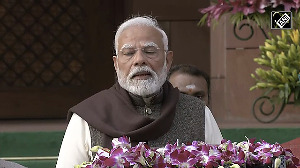This is the first conviction of Telgi who is lodged in Yerwada prison in Pune. He was not present when the judgment was delivered but appeared on television through video conferencing. Special Judge U D Salvi delivered the judgment in the jam-packed courtroom.
Telgi's associates Sanjay Gaikwad and Ram Ratan Soni were also convicted.
Telgi, Gaikward and Soni were awarded rigorous imprisonment for ten years and Rs 50,000 fine on the charge of conspiracy. Prosecutor Pradeep Gharad sought maximum life punishment for the accused but all of them pleaded clemency on humanitarian grounds. Telgi through video conferencing urged the court to show lineancy as he was suffering from HIV/AIDS and his wife was admitted to the hospital.
The entire trial was held through video-conferencing, prosecutor Pradeep Gharat said adding this was the first case in which the proceedings were conducted through this method. The prosecution's case is that in 1995 Poornanand and Co, a solicitor firm, had to execute two documents on behalf of its client and required special adhesive stamps worth Rs 16,58,990 lakh to be affixed thereon. There was urgency in the matter as the client was to go abroad.
Someone suggested to them that Telgi could do this and the firm approached him. Telgi's employee Rakesh Sharma went to the solicitor's office, collected the document and allegedly affixed fake stamps. He also gave receipt of delivery of stamps signed by Telgi, promising to deliver the original receipt of General Stamp Office.
However, he failed to deliver. The company got suspicious and verified from General Stamp Office only to be told there was no sale of the stamps. A complaint was lodged by solicitor's advocate Manish Parekh with Superintendent of Stamps Radhesham Mopalwar who in turn lodged an FIR with MRA Marg Police Station.
During investigation, three accused, including Telgi, were arrested and a chargesheet was filed against them by CBI.
In all, 17 witnesses were examined during the trial, which concluded on December 26. The three were charged with Indian Penal Code sections 255 (counterfeiting government stamps), 256 (possessing material for counterfeiting stamps), 258 (selling counterfeit stamps), 259 (possessing counterfeit stamps), 420 (cheating), read with 511 (punishment for counterfeiting) and 120-b IPC (conspiracy) read with all these sections.
Besides, they were also charged with sections 63 A and 63 B of Bombay Stamp Act.
Complete Coverage: The stamp of corruption






 © 2025
© 2025